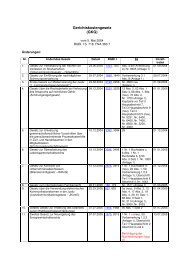The Netherlands Drug Situation 2010 - Trimbos-instituut
The Netherlands Drug Situation 2010 - Trimbos-instituut
The Netherlands Drug Situation 2010 - Trimbos-instituut
Create successful ePaper yourself
Turn your PDF publications into a flip-book with our unique Google optimized e-Paper software.
<strong>The</strong> question has remained how to implement the RIOB in all institutes for addictioncare. <strong>The</strong> recommendations of the implementation report suggest that the guidelineshould be translated to organization-specific handbooks that enable more consensus ontargets, target groups, methods, and implementation of methadone maintenance treatment(Loth et al. 2006). A final recommendation points at the necessity of a nationalstructure for the routine monitoring of the clinical effects of methadone treatment (Verbruggeet al. 2005;Walburg 1997). <strong>The</strong> implicit assumption seems to be that routine outcomemonitoring will increase the use of these guidelines.In the near future, a new guideline for methadone treatment will be built upon thecurrent one (see § 11.2.4). <strong>The</strong> new guideline will be more strictly evidence based byfollowing a specific procedure coinciding with current procedures in medical science.11.3.5 Future developmentsTwo seemingly inconsistent developments can be seen in the guidelines movement in the<strong>Netherlands</strong>, though perhaps less in addiction care than in mental health care: standardizationand diversification.<strong>The</strong> initial idea and goal of evidence-based medicine was and is to diminish ineffectivevariation in care for equal or comparable health problems. A certain degree of standardizationshould guide clinical practice towards a higher comparability of clinical practice forsimilar problem areas. <strong>The</strong> assumption is that this will also lead towards a higher qualityof cure and care for the patients. Standardization can be considered a congruent byproductof evidence-based medicine. Guidelines are a step on the path of changinghealth care in the direction of evidence-based medicine.Nevertheless, standardization in this sense has its limits. National guidelines can partlybe a specification of international guidelines, because international guidelines are oftendirected at governmental organizations and institutions for public health. <strong>The</strong>se generalguidelines should be translated and adapted towards recommendations that fit nationalor regional daily-practice situations (Burgers et al. 2009;Burgers et al. 2004;WHO 2009).<strong>The</strong> current guidelines in the Dutch addiction care are still rather generally formulated.<strong>The</strong>refore, some perspectives on guideline construction stress the importance of diversificationof guidelines by improving the clinical value of guidelines. This could be done byadapting the content of these guidelines to specific subgroups and circumstances, basedon the results of guideline implementation found in naturalistic, practice-based studiesamong these subgroups. In this sense, adaptation may be recommended to improve clinicaloutcomes, quality of life and client satisfaction. 1 Specification or diversification mayalso increase the user-friendliness and consequently the use of these guidelines.Diversification may also be the product of the commitment of managers, professionalsand patients in the construction of guidelines. It has been shown that the implementationcan be improved by involving these stakeholders from the start in the construction ofguidelines. One of the dangers that remains however, is that the adaptation of the guidelinesmay result in a decrease of the effectiveness of interventions, when compared tothe original interventions based on well-controlled studies. Thus, treatment integrity maybe violated.<strong>The</strong> products of the AGREE Collaboration and the products of the Guidelines InternationalNetwork (GIN) are well known in the <strong>Netherlands</strong>, and many professional organizationsare member of one or both organizations. In the <strong>Netherlands</strong> a separate organiza-1 Walburg, J. (2009). Chairman of the Board of Directors of the <strong>Trimbos</strong> Institute. Presentation during the Great Guideline Congress.Amsterdam, December 8 th .174




